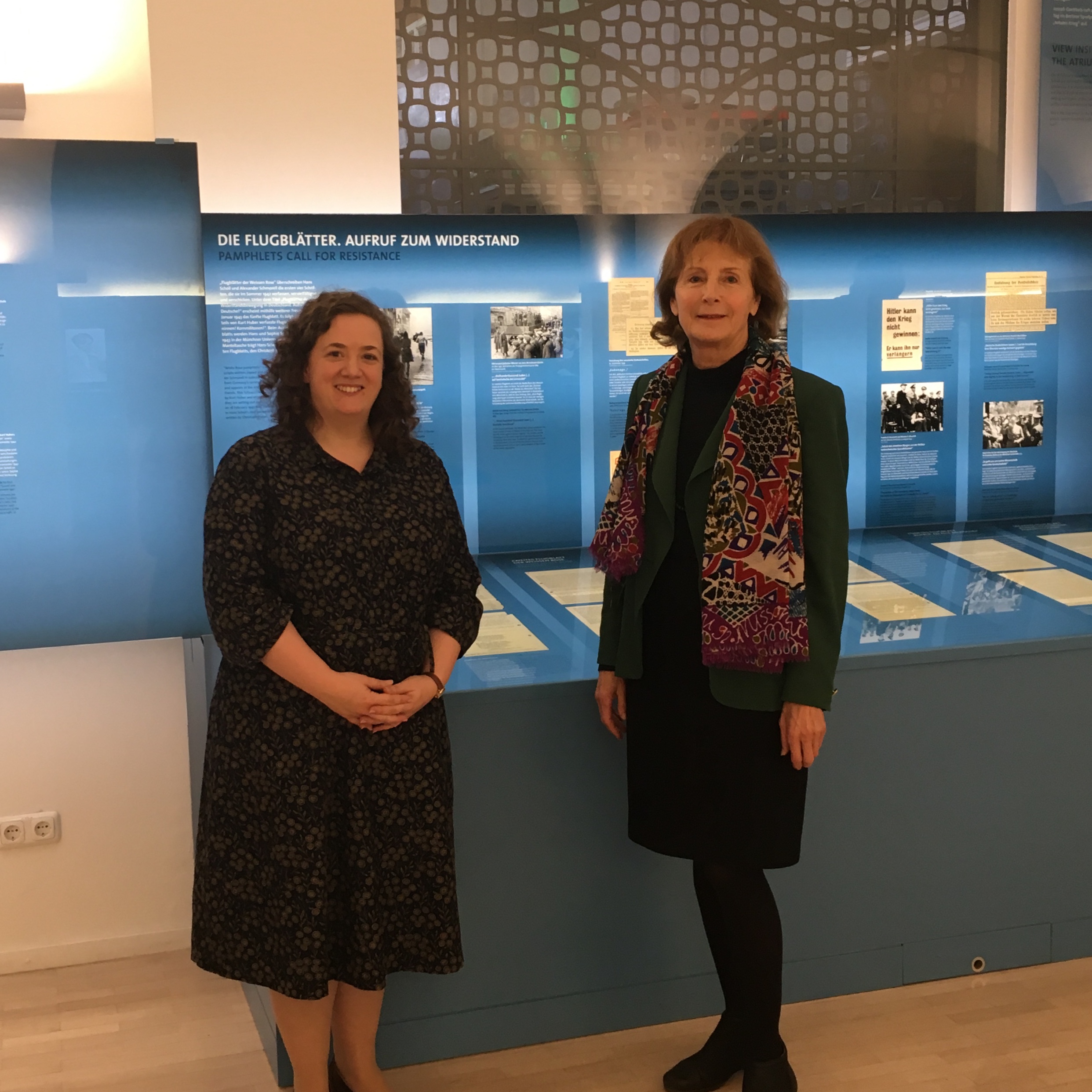Dr. Hildegard Kronawitter, Chairwoman of the White Rose Foundation (Weiße Rose Stiftung) Munich, gives a welcome address at the start of the symposium. From 2019-2020 the Foundation is a partner organisation of the White Rose Project as part of the Knowledge Exchange Programme funded by The Oxford Research Centre in the Humanities (TORCH).
Dear Dr. Alexandra Lloyd,
Ladies and Gentlemen!
I am very happy to attend the symposium on the White Rose here in Oxford in St Edmund Hall. Many thanks dear Ms. Lloyd for your special engagement and the choice of the topic. You are the initiator and organizer of this very important academic discussion. But I also pay a high tribute to all the speakers. I am very interested to hear what you have to say about the various aspects and I am looking forward to getting valuable impetus for our commemorative work, which is taking place in Germany especially in Munich. As you can see, I am very curious about the research findings from this esteemed body.
So let me say many thanks to everybody on behalf of the White Rose Foundation in Munich for your interest and great commitment to this resistance group. I would like to explain in a few words what the White Rose Foundation is and why it was founded. It is a typical NGO which gets too few donations from municipal administrations and from the Bavarian State. But it has a circle of many friends who support our work financially and morally. Our organization was founded in 1987 by White Rose supporters, who were convicted in 1943, and by family members such as Anneliese Knoop-Graf and Inge Aicher-Scholl, and a few politicians. Our task is to keep alive the memory of the White Rose, to honor its protagonists and to strengthen respect for human dignity, civil courage, tolerance and personal responsibility in our time.
Allow me to comment on my part: I was recruited to chair the Foundation ten years ago and have been appointed ever since. We have a board with members from White Rose families and other supporters; we have some employees and many volunteers who contribute their working time and knowledge.
Our work is divided into four areas:
The first is the White Rose Memorial, we call it DenkStätte – it is a museum, also a special place of remembrance and an exhibition. It is situated next to the atrium of Ludwig-Maximilians-Universität in Munich, where on the 18th of February 1943 Hans and Sophie Scholl distributed the sixth pamphlet and were consequently arrested. The Denkstätte maintains a permanent exhibition and tells the story of the group through documents, images, texts, and interactive media installations. It makes visible the context of the Nazi dictatorship and its war crimes, as well as the history of those ideas which influenced the group and strengthened its resistance. In 2019 the DenkStätte had almost 50,000 visitors; more than a third came from abroad.
Our next task is to present the travelling exhibition about the White Rose in Germany and other countries. We have been doing this for more than 20 years with various partners. The travelling exhibition is the medium by which schools and other cultural institutions invite their audiences to learn about the White Rose and to reconsider the group’s message for our time. These travelling exhibitions have been presented in many locations for example in Italy, Poland, Russia or the USA and in the local language. It would be a pleasure for us to see this exhibition also shown in England. But I want to be fair: last year’s display on the White Rose at the Bodleian Library was an admirable alternative to our travelling exhibition.
Our special aim is to encourage young people to extend their knowledge of the Third Reich, of all the atrocities which took place during the Second World War and of the resistance through their own historical research and archival work. So we like to cooperate with schools and colleges in historical-educational projects.
The last task involves thematic events such as the presentation of a new biography. We also organize readings, remembrance concerts and theatre performances with different partners. For example, when Alexandra Lloyd visited Munich she was able to see the play “Sophie Scholl. Liebe in Zeiten des Widerstands”. As with other educational institutions, the White Rose Foundation uses social media. Our homepage had around 400,000 visitors in 2019 and on Facebook our weekly posts reach almost 5,000 friends.
Now I’ll stop talking about our work and instead I would like to mention the importance of this symposium and the projects already carried out on the White Rose at Oxford. As I already mentioned, we appreciate Alexandra Lloyd’s White Rose Project very much. In short: she has brought the White Rose to England – with the translation of the leaflets, the publication of the book in the series “Treasures of the Tylorian”, the memorial concert at University Church of St. Mary the Virgin on the 22th of February and now with this meeting. She inspired her students to become interested in the topic and received a donation from the funds of her university for her project. So I really hope that she will be able to continue this special engagement.
I would like many students in Oxford to discover what role models the protagonists of the White Rose can be in their personal choices. These role models may help them in their own decisions, helping them to be tolerant, to show compassion and to take a stand against racism and xenophobia. In Germany nowadays, we are witnessing anti-semitism and xenophobia, intolerance and inhumanity. None of this is acceptable because behavior which follows these patterns destroys an open society. And an open society is a prerequisite for a functioning democracy that needs both exchange and controversy for satisfactory decision-making.
The message of the White Rose can remind us to maintain our humanity even in difficult times.
